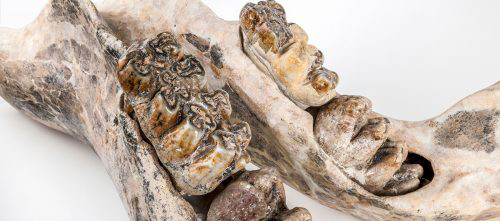 Vertebrate Paleontology
Vertebrate Paleontology
The Vertebrate Paleontology Division houses the nation’s third-largest collection of cataloged vertebrate fossils, with a total of about 900,000 specimens mainly from the last 65 million years. Approximately 75% of the specimens are from about 1,200 localities in Florida. The species accounts are linked with the Vertebrate Fossil Sites of Florida, which provides information on the localities of the fossils.
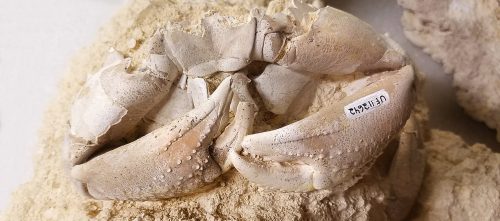 Invertebrate Paleontology
Invertebrate Paleontology
The Florida Museum’s Invertebrate Paleontology Division houses nearly 6.5 million specimens, mostly collected from over 7,500 sites in Florida, the southeastern U.S., the Caribbean, Central and South America and Antarctica. It is largely composed of fossil invertebrates from the last
65 million years.
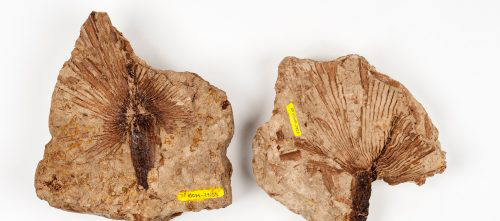 Paleobotany and Palynology
Paleobotany and Palynology
The Florida Museum’s Paleobotanical Division includes approximately 250,000 specimens, ranging from the Proterozoic to the Pleistocene, and includes collections from more than 50 countries. The online collection database contains more than 70,000 digitized records of the collection.
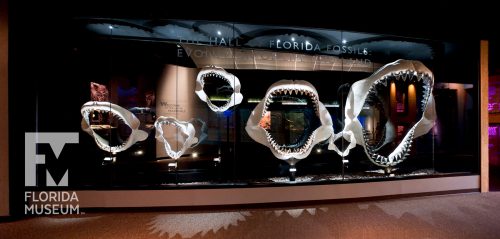 Fossil Sharks
Fossil Sharks
Sharks are sometimes referred to as “living fossils.” Ancient sharks lived in the oceans long before animals colonized the land and most fossil evidence of early sharks exists as fossil teeth along with a few skin impressions.
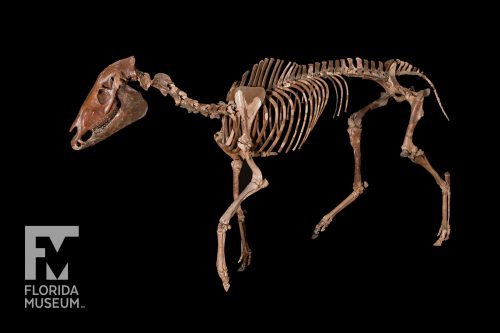 Fossil Horses
Fossil Horses
The fossil record shows horses originated in North America at least 55 million years ago and roamed the continent before becoming extinct at the end of the last ice age, about 10,000 years ago. Because horses have been around a long time, learning about their evolution provides unusual insight into the patterns of evolution in general.
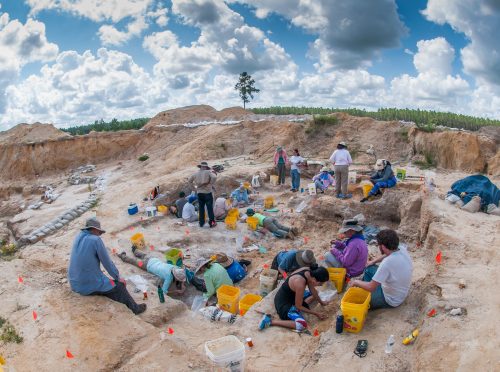 Montbrook Fossil Dig Site
Montbrook Fossil Dig Site
This fossil site is believed to be 5 to 5.5 million years old (latest Miocene – earliest Pliocene) and an ancient freshwater river system relatively close to a coast, teeming with fish, amphibians, snakes, turtles, alligators and water birds.
View images and hear stories about select objects from the Florida Museum’s paleontological collections:
Agatized Fossil Coral
Ancient Alligator
Ancient Great White Shark
Blue Hole Reptiles
Blunt-Snouted Dyrosaurid
Caribbean Monk Seal
Cofrin’s Side-necked turtle
Columbian Mammoth
Columbian Mammoth: Exhibit
Dwarf Tortoise
Fossil Palm
Fossil Seagrasses
Giant Armadillos and Giant Sloths
Gracile Saber-Toothed Cat
Grape Fossil – World’s Oldest
Horse Evolution: Ancient Horses
Horse Evolution: Three-toed Transitional Horse
Horse Evolution: North American Ancestors
Megalodon: Miocene Megatoothed Shark
Megalodon: Megalodon Shark
Rhinoceroses
Titanoboa
Terror Bird
White’s Bear-Dog